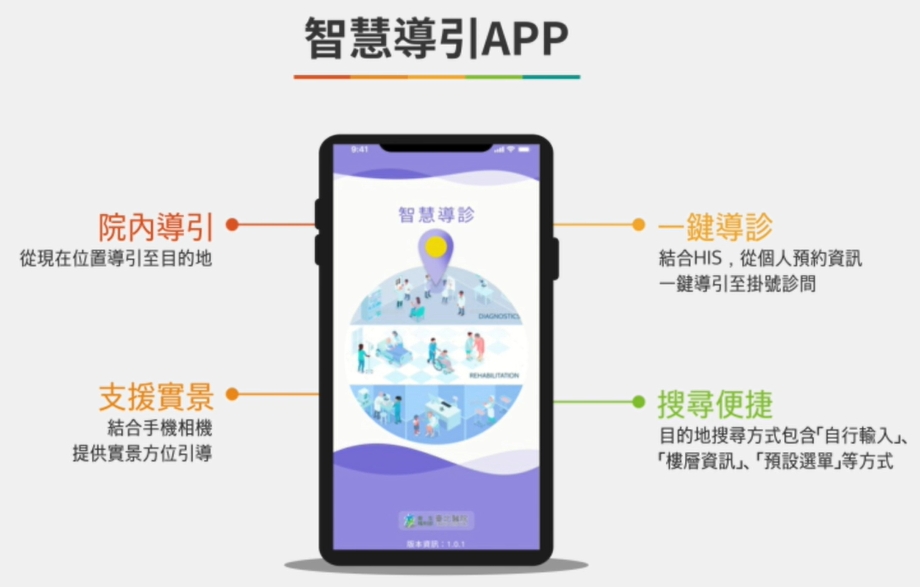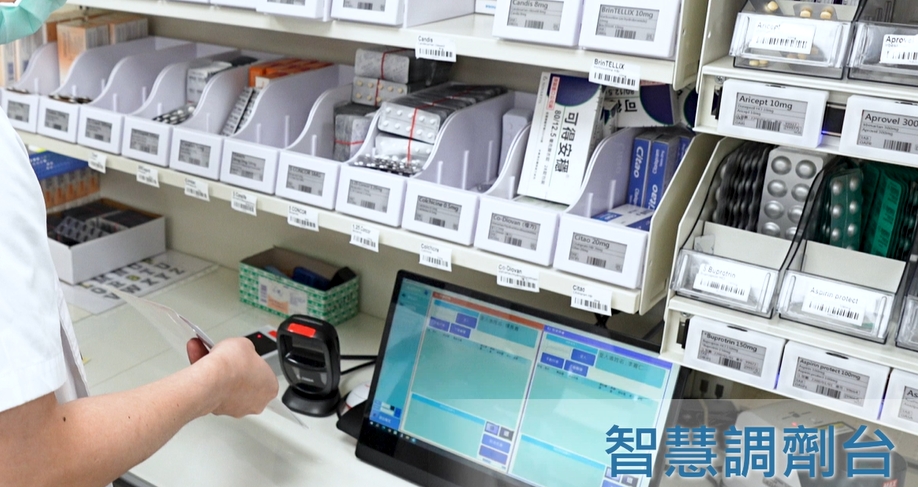
After 6 months of preparation, Taipei Hospital, Ministry of Health and Welfare (hereinafter Taipei Hospital) pioneered the replacement of its Integrated Innovative Healthcare Information System (TnHIS), becoming the first national hospital to integrate and revamp its HIS system. This transformational change involves consolidating various system data through an integrated cross-platform hub, connecting HIS and NIS systems with in-house digital applications, and accelerating the implementation of various smart healthcare initiatives.
Taipei Hospital, in collaboration with 10 partner companies, will exhibit their products and services during the 2023 Healthcare+ Expo. Focusing on outpatient services, smart management, and clinical care, they will bring together technologies such as Augmented Reality (AR), Bluetooth, millimeter waves, AI, and more. This comprehensive approach includes all-in-one solutions for smart consultation rooms, intelligent nursing stations, smart wards, and pharmacies. Through cross-industry collaboration, they aim to validate advanced digital health services.
Outpatient Services Using Instant Messenger and AR-based Navigation
Appointment-Making using LINE
Taipei Hospital uses LINE to build its appointment system, providing speech input for semantic scheduling to enhance user convenience. After making an appointment, users can not only check their booking history, but also receive proactive reminders for their appointments. This, combined with the ability to check the progress of examinations, minimises waiting times for users. If patients need to pick up medication for chronic conditions at subsequent visits, the system will remind them to pick up their prescription medication.
In-Hospital Navigation
Navigating Taipei Hospital is made easy with the integration of an indoor positioning system. The hospital's app introduces a navigation feature supporting AR-based real-time guidance. Through the app's quick search functionality and arrow indicators, users can be accurately and swiftly directed to various locations within the hospital, akin to using Google Maps.

In-hospital navigation app with more functionalities for outpatients (Photo by Taipei Hospital)
Smart Management: Locating Medical Devices Quickly with Bluetooth Technology and UDI System
Fusion Indoor Bluetooth Finding Medical Devices
The hospital is setting up location-based network stations and attaching Bluetooth transmitters to medical equipment to enable real-time positioning of medical equipment. This helps nurses locate equipment quickly and improves the efficiency of shift inventories. Prior to implementation, nurses spent an average of 22 minutes on equipment rounds. Now, the average time is approximately 6.5 minutes, saving more than 15 minutes on rounds.
Unique Device Identification (UDI) system for Medical Devices
Taipei Hospital has implemented the Unique Device Identification (UDI) system for medical equipment. This system automatically checks whether the information for 202 categories of items needs to be recorded and reported according to regulations, and it records consumption for billing purposes by scanning codes. In addition, an advanced visual interface has been introduced for complex devices such as bone screws and plates, allowing clinical staff to use them intuitively with a simple click. Taipei Hospital is the first in the country to complete UDI integration for cardiac catheters and vital signs equipment, enabling chronological recording of equipment usage.
Patient Care: Millimeter-Wave Radar Detection for Bed Exit, Bluetooth Physiological Monitoring for Abnormal Alerts, and Information Convergence
Fusion Continuous Physiological Monitoring System
Patients wear Bluetooth-enabled physiological monitoring devices such as heart rate monitors, blood oxygen sensors and thermometers. The signals from these devices are transmitted to a networked base station, allowing healthcare providers to monitor the condition of multiple patients simultaneously. In the event of abnormal physiological data, the system immediately sends notifications to the healthcare team for timely intervention.
The Fusion Millimeter Wave Radar Detection System eliminates the need for patients to wear monitoring devices while providing critical data such as respiratory rate, fall detection and bed exit status. This system uses millimetre wave radar technology, making it suitable for isolation rooms, touch-free wards or scenarios where prolonged monitoring of physiological data is required. It enables healthcare providers to remotely assess the respiratory status of patients without direct contact.
Digital Bedside Card and Real-time Command System
The digital bedside card ensures that patient information is comprehensive and immediately available on the ward. It contains details such as patient data and care-related instructions, enabling healthcare providers to access real-time information for improved quality of care.
Taipei Hospital has also developed a smart electronic whiteboard with a real-time dynamic command system. This system integrates information necessary for ward operations, such as medical, nursing, laboratory, examination, pharmacy and administrative data. It serves as a collaborative platform for various professionals within the hospital, including doctors, nurses, pharmacists and therapists. The powerful display interface uses visual icons to present information clearly and vividly, enabling real-time monitoring of patient dynamics.
★★★More by MOHW Taipei Hospital
◎Smart Clinic AI Image Interpretation System
Using real-time AI, this system automatically interprets patient images such as X-rays and CT scans. After a patient has been examined, the AI-calculated results and images are synchronised and displayed on the system for review by healthcare professionals. The system helps doctors interpret tiny lesions that are difficult to see with the naked eye, improving diagnostic efficiency.
◎Remote Smart Clinic System
By implementing a mobile remote smart gateway, the system enhances the convenience and flexibility of healthcare professionals performing out-of-hospital medical tasks, including diagnosis, health checks and health promotion. With a patient-centred approach and integration with the next-generation TnHIS, community-based healthcare professionals can understand the health status of individual cases, adjust treatment plans as needed, and ensure comprehensive storage of medical records.
◎AIoT Preventing Indoor Air Pollution Exceedance
The FusionAir indoor air purification system consists of environmental sensors and purifiers. The environmental sensors continuously detect indoor pollutants such as PM2.5, carbon dioxide, carbon monoxide, formaldehyde and total volatile organic compounds (TVOC) around the clock. It responds immediately to treat and purify these common indoor air pollutants.
◎Smart Pharmacy
Taipei Hospital is using an AI-based dispensing system to help pharmacists improve the accuracy and efficiency of drug dispensing while reducing the risk of dispensing errors. The system replaces traditional sticker-style drug labels with an electronic paper model that clearly displays the drug name, including both Chinese and ingredient names, expiration date and inventory quantity. It also provides guidance through a light-guided mode, assisting with dosage calculations and recording functions.

Smart drug dispensing system ensuring safety and efficiency (Photo by Taipei Hospital)
In addition, by integrating with the hospital's internal medical information system, the Smart Dispensing Station automatically retrieves the patient's medication history and relevant medical information. This significantly reduces the workload for pharmacists and minimizes the risks of medication errors and damage to medications. It enhances the quality and efficiency of medication management, ensuring patient medication safety.
B2B Opportunities with MOHW Taipei Hospital
AI in Healthcare
| Products/Solutions | Partnership wanted |
|---|---|
| AI-assisted medical imaging system for X-rays, CT scans, etc., focusing on nodules and small lesions in the brain | Software and product sales |
| Chatbot integrated into LINE and intra-hospital app for outpatients to access information and medical staff to access health records | Software and product sales |
Digital Health
| Products/Solutions | Partnership wanted |
|---|---|
| In-hospital navigation with AR | Software and product sales |
| Automated UDI for medical devices | Software and product sales |
| AIoT air quality monitoring with sensors and purifiers | Software and product sales |
| Smart pharmacy with drug bag management, dispensing, storage integrated | Software and product sales |
| Smart ward solution that integrates health records and ward-related information | Software and product sales |
Taipei Hospital, Ministry of Health and Welfare at Healthcare+ Expo 2023
- Thursday, 30 November to Sunday, 3 December
- Booth No. J402 | 1F, TaiNEX 1
